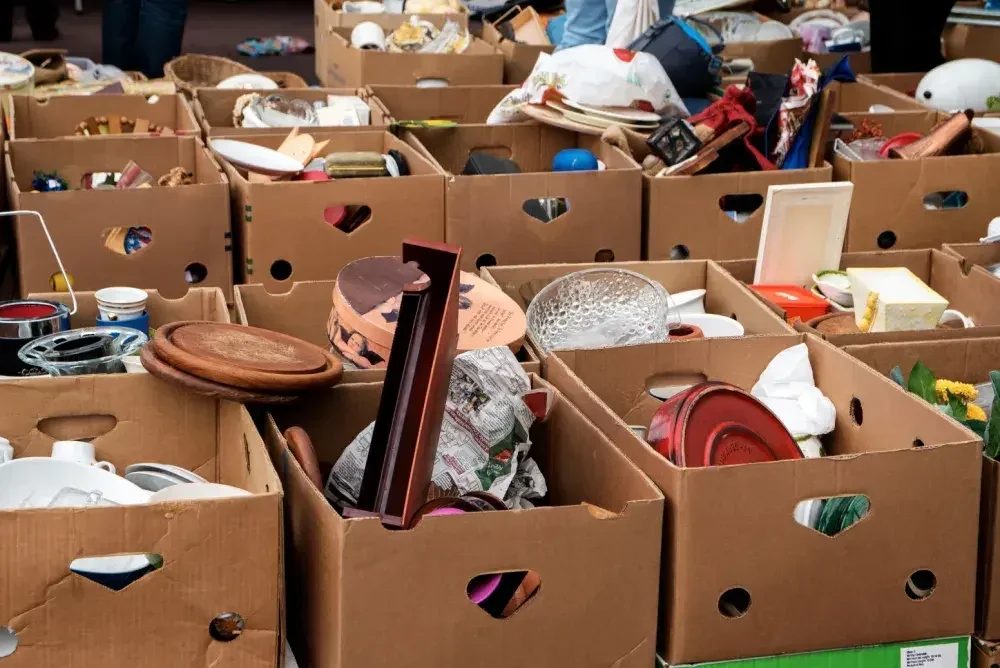An estate sale is the process of selling someone’s personal possessions, usually after their death. In some instances, a divorce, bankruptcy, or severe medical condition can result in an estate sale. This could be through a sale, liquidation, donation, or auction.
Estate sales occur over a few days to a week and are open to the general public. But there are some legal considerations to keep in mind.
Learn about the estate sale process so you get it right and honor your loved one’s wishes.

What are estate sale items?
Antiques, fine jewelry, furniture, artwork, vintage clothing, electronics, crockery, power tools, cars, and other valuables can all be items for sale.
Who manages an estate sale?
If you have legal authority over the estate, you can manage this process yourself or hire a third party to do so on your behalf. If the legal authority lies with an estate attorney or estate executor, that person will be responsible for the sale.
Estate sales vs. garage sales
An estate sale is a formal process generally triggered by major life events, like the death of an owner, divorce, a significant change in financial status, or a medical condition that requires immediate downsizing. Garage and yard sales, also known as tag sales, are more about getting rid of unneeded items.
Estate sales vs. auctions
The primary difference between the two is that in an estate auction, items are sold one by one, while in an estate sale, items can be sold in bulk. Also, in an auction, the item goes to the highest bidder. Estate sales work on a first-come, first-served basis.
An auction house tends to do a better job of securing the fair market value for high-ticket items and other valuables.

Advantages of an estate sale
These are some of the most common reasons people prefer having a sale over donating or getting rid of personal belongings.
1. An efficient way to get rid of a large number of assets
An estate sale involves selling a large number of items in one go: It’s a practical and efficient way to downsize. Since it typically happens at the house, there’s no need to relocate the items, which can result in huge cost savings.
2. Helps you honor your loved one’s wishes
Your family member might have left a will with their attorney or financial adviser with an estate plan that describes how their personal property should be handled. If they have specifically expressed their desire for an estate sale, that request will have to be followed through.
It’s also important to consider that these personal possessions might hold sentimental value for the deceased. By undergoing an estate sale and not discarding assets through a yard sale, you are honoring their legacy and doing something meaningful with their belongings.
3. Chance of higher profits
When the sales process is done well, there’s a greater chance for profits and returns. Outsourcing this to an estate sale organizer can generate even higher returns.
4. Sustainable way to reuse items
You’re giving a second life to your loved one’s possessions and keeping them out of the landfills.
Do I need an estate attorney for an estate sale?
You might. This depends on a few factors.
The first thing you need to look into is the legal authority to have an estate sale. The legal authority usually resides with the executor of the estate. This could be a family member, friend, or the estate attorney or estate counsel.
Find out if there is a last will or testament for the estate. If there is no will or the will doesn’t mention a beneficiary or estate executor, then the estate might have to undergo probate. The probate process is subject to state laws, and whether minor children are involved in the estate plans.

Other legal considerations
There are a few other legal matters you should be aware of:
- Depending on your state and location, you may need to secure applicable permits and licenses. To get the essential permits, speak to your county office or town hall.
- Likewise, some states mandate sales tax payments on items sold. For example, if you are running an estate sale in New York, you will need to report your earnings and pay sales tax on the proceeds.
- Also, inherited property that appreciates significantly can result in massive capital gains and inheritance taxes for an heir or beneficiary.
Adhering to legal requirements, tax protocol, and local laws will save you from potential fines and headaches. It’s advisable to consult an experienced estate planning attorney or tax lawyer. An attorney or lawyer can:
- Ensure tax compliance
- Provide you with comprehensive documents
- Suggest tips on how to distribute the profits from the sale
- Offer advice on whether you should hire an estate sale company

DIY estate sales process
An estate sale isn’t like a garage or yard sale that you can just throw together. It requires meticulous planning so you can get maximum returns. Follow these steps to organize and complete a successful estate sale yourself.
1. Take inventory of all items
Write down all items that are there to be sold. If the original owner has left an estate plan, there might be certain items that they have already allotted to beneficiaries. Those items can’t be sold.
2. Determine a price list
Set a price list based on the type of item, condition, demand for the item, and rarity. Your location will also impact the price. For instance, the demand for limited-edition ski boots in Los Angeles may be fairly low.
Understand the fair market value by looking up similar items on marketplaces like Facebook Marketplace, Yelp, online auction sites, and estate sale databases. You can even consult a professional estate seller to establish a price list.
3. Advertise the event
Promote the estate sale online, at local businesses, and through flyers and local newspapers. Include a list of items for sale, pictures, and clear descriptions to attract the largest pool of buyers. Don’t forget to mention the date and location of the event.
4. Organize and execute the sale
Prepare the house in an aesthetic and practical way for the sale. It’s a good idea to place items so they are visible to the maximum number of buyers. Good lighting, clear price tags, and uncluttered walking pathways will reduce chaos and minimize potential damage. Also, have a number system to keep track of items sold and cash received.
Consider hiring extra help or an estate sale organizer if you feel you need more hands on deck to manage the estate sale work.
5. Decide what to do with unsold items
It’s highly likely that despite your best efforts, there will be some leftover items. Have a plan for what you are going to do with them. You can consider donating items to the owner’s favorite organization, auction house, or charity.

Benefits of a professional estate sale company
If the idea of sorting through all the possessions, pricing, advertising, and managing the legal requirements of an estate sale sounds overwhelming, consider working with an established estate attorney or a professional company.
Professional estate sale companies can handle the complete process for you for a commission or a flat fee. As experts in the field, they can also help you sell personal belongings and secure the best deals for high-ticket items in a structured and systematic manner. In some cases, they will also take away unsold items for an additional fee.
Let’s not forget that the death of a loved one or a medical condition that triggered the sale is a stressful time for the family. You might think that selling the dining set is easy, but it’s not. Estate sale organizers can ease your burden and stress in these emotionally charged circumstances.
How to find an estate sales company
A quick Google search will give you multiple estate auction houses and estate sales companies. Family members and friends can also provide a few recommendations. Ask the following questions as part of your due diligence:
- How many years of experience do you have?
- What is your marketing and advertising strategy?
- How large is your mailing list of potential buyers?
- How do you handle tax implications?
- Can you provide references?
- Will you help with the removal and donation of unsold items?
- Will you provide a written contract?
You can also visit the estate seller’s upcoming estate sales to get first-hand experience with their service. Check with your local Better Business Bureau (BBB) for more information about any estate sale company you’re considering.
How much does an estate sale cost?
An estate sale will cost more than a garage sale, especially if you choose to go with a professional provider. You can expect most estate sales companies to charge a commission between 25% and 50%. That might seem like a lot of money, but for this fee, they will offload the entire sales process.
The range of commission they charge will depend on the amount and value of items to sell. The more complicated the possessions and comprehensive their service, the higher the commission will be. Some firms offer sliding commission rates. This means that they will charge a lower percentage if the gross sales are higher.
How much does an estate planning attorney cost?
Many attorneys charge $200-$500 per hour for estate sales. Lawyers’ rates depend on their experience, location, and the complexity of the estate.
Our platform helps you create or update your plan—step-by-step, with attorney support when you need it.

Estate sales are a practical way of settling the estate of a deceased person or someone who is unable to care for their belongings. However, the sales process can be daunting because it requires careful planning and an understanding of a few legal considerations.
Proper guidance from an estate attorney can make managing someone’s personal property rewarding and financially advantageous.

